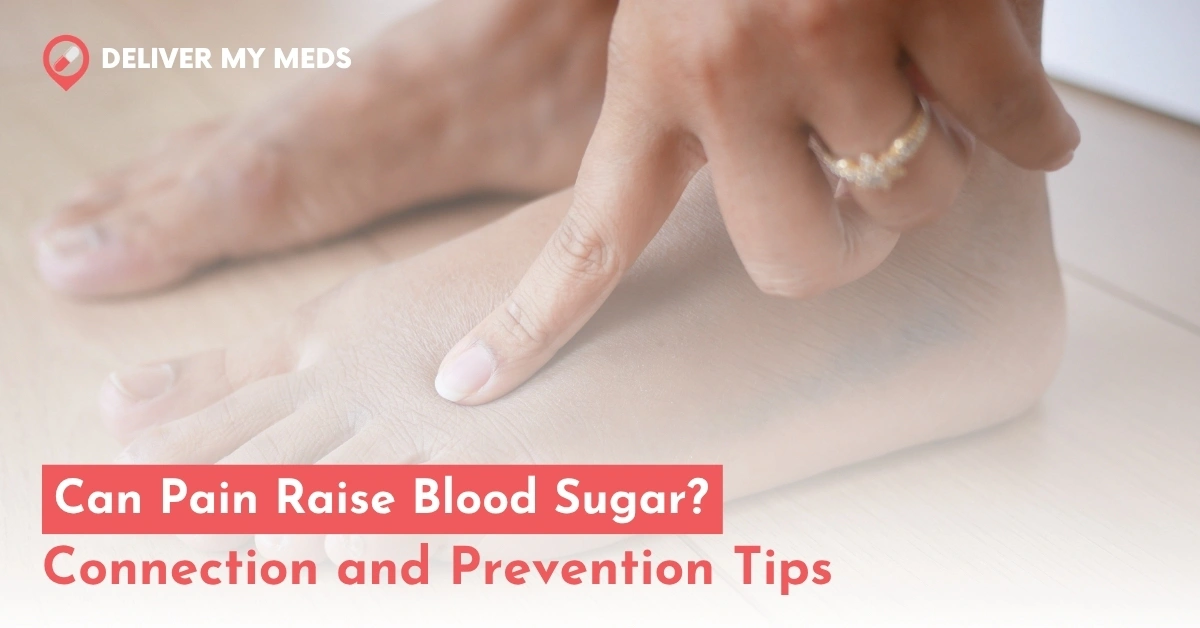
Many factors can cause blood glucose fluctuations, and thus, continuous monitoring of blood sugar levels plays a vital role in managing healthy blood sugar levels. Considering the facts, increasing blood glucose levels include but are not limited to stress, liver issues, carb-rich foods, and more. As stress can raise blood sugar levels, you may be wondering, ‘Can pain raise blood sugar?’
The short answer is ‘yes’. A report shared by the ADA shows how people with severe pain had difficulty managing their blood sugar. Pain activates a stress response, as a result body produces cortisol and adrenaline hormones – as a result, your blood glucose spikes. Here we’ve explored why pain can elevate blood glucose, the role of sleep and relief in managing blood sugar, and the reasons behind spikes in morning and evening blood glucose levels.
The Connection Between Pain and Blood Sugar
Hormones like cortisol and adrenaline, which are triggered as a body’s stress response, exist in your body to handle stress. According to healthdirect, ‘Adrenaline makes your heart beat faster than usual and your lungs breathe more efficiently. Your blood vessels are stimulated during this time, which allows more blood towards your brain and muscles. As a result, your blood pressure goes high and your brain stays more alert. Your blood sugar levels go high to give you more energy, and pupils grow larger, resulting in sweat. Thus, helping you to keep moving in any stressful situation, including fights.’
Too much of such situations (chronic pain) can give your body a hard time utilising this glucose, leading to a rise in blood sugar levels. Thus, individuals who experience persistent pain, such as from arthritis or nerve damage, often have more difficulty controlling their blood sugar levels.
Can Relief or Good Sleep Lower Blood Sugar?
Getting relief from pain or having a good night’s sleep can help lower blood sugar back to normal levels. When pain is eased, the body can relax, and the production of stress hormones decreases. This, in turn, helps restore normal blood sugar regulation. Adequate sleep is also important for healthy diabetes management – it helps the body regulate insulin sensitivity. In contrast to high stress, which elevates blood sugar, a relaxed mind and adequate sleep improve insulin sensitivity, leading to naturally better blood sugar control.
Do you make informed decisions?
Continuous glucose monitoring systems (CGM systems), such as Freestyle Libre 2 Plus sensors, keep you informed about your blood sugar 24/7, allowing informed decisions for better diabetes management.
Reasons for Blood Sugar Spikes in the Morning
Many individuals with diabetes notice that their blood glucose level is high in the morning, a phenomenon often referred to as the “Dawn Phenomenon.” This spike is typically caused by the body’s natural release of hormones like cortisol and growth hormone during the early morning hours. These hormones help prepare the body for the day ahead, but can also cause an increase in blood glucose.
The body’s insulin sensitivity is generally lower in the morning, further contributing to elevated blood sugar levels. For individuals with type 1 diabetes, the first meal of the day often causes a spike in blood sugar, which can be challenging to manage.
Here you may find the connection between high Blood sugar and sleeping.
Reasons for Blood Sugar Spikes at Night
Blood sugar levels can also rise at night, particularly for individuals who do not effectively manage their glucose throughout the day. Factors such as stress, late-night snacking, or even physical activity can contribute to elevated blood glucose levels. Additionally, some individuals may experience insulin resistance in the evening, which makes it harder for the body to regulate sugar levels. Certain medications can also play a role in nighttime spikes.
Did you know?
CGM sensors offer low and high glucose alerts, thus minimising the adverse glycemic events. Check out your eligibility today with DeliverMyMeds and receive supplies at your door.
Is There a Connection Between Low Blood Sugar and Hypertension?
While high blood sugar is commonly associated with diabetes, low blood sugar (hypoglycemia) is another concern for individuals managing the condition. Interestingly, low blood sugar and hypertension may have a connection. Research suggests that low blood pressure is often observed in people experiencing severe hypoglycemia, especially in those who are on medications like insulin. However, diabetes and high blood pressure (hypertension) are often linked, as individuals with diabetes are at a higher risk of developing high blood pressure due to the strain that diabetes places on the blood vessels.
Insights from the Reddit Community
In a Reddit discussion about pain and diabetes management, users shared personal experiences about how anything abnormal in the body, may that be physical or emotional, can cause blood sugar to rise. Some people even added that before the detection of COVID-19, they experienced constant high blood sugar levels for some days. All these insights second the ‘fight or flight’ phenomenon.
You may be wondering, ‘Does ibuprofen raise blood sugar?’ Medications such as ibuprofen and Tylenol do not directly impact glucose levels, but higher doses may result in lower blood glucose levels.
Do Pain Relievers Affect Blood Sugar?
Medications like ibuprofen and Tylenol are commonly used to relieve pain, but they can impact blood sugar in various ways. Ibuprofen, a non-steroidal anti-inflammatory drug (NSAID), is often questioned in terms of its effect on blood sugar. Some studies suggest that ibuprofen can raise blood glucose, especially when taken in higher doses.
On the other hand, Tylenol (acetaminophen) is generally considered safer in terms of its effects on glucose levels. However, it is always important to consult with a healthcare provider before taking any medication to ensure it won’t interfere with blood sugar control.
Conclusion
Pain activates stress hormones, which then increase sugar production from the liver; this proves that pain does raise blood sugar. Understanding blood sugar is a multilayered phenomenon. Different factors, such as stress, medications, and sleep, affect glucose levels. It’s important to consider how physical and emotional pain can contribute to elevated blood sugar, and how both are equally important in ensuring proper pain and diabetes management.
On top, managing blood sugar is easier with the help of CGM Monitoring devices, which can be claimed using your insurance or bought directly using your debit/credit card – all with DeliverMyMeds.



